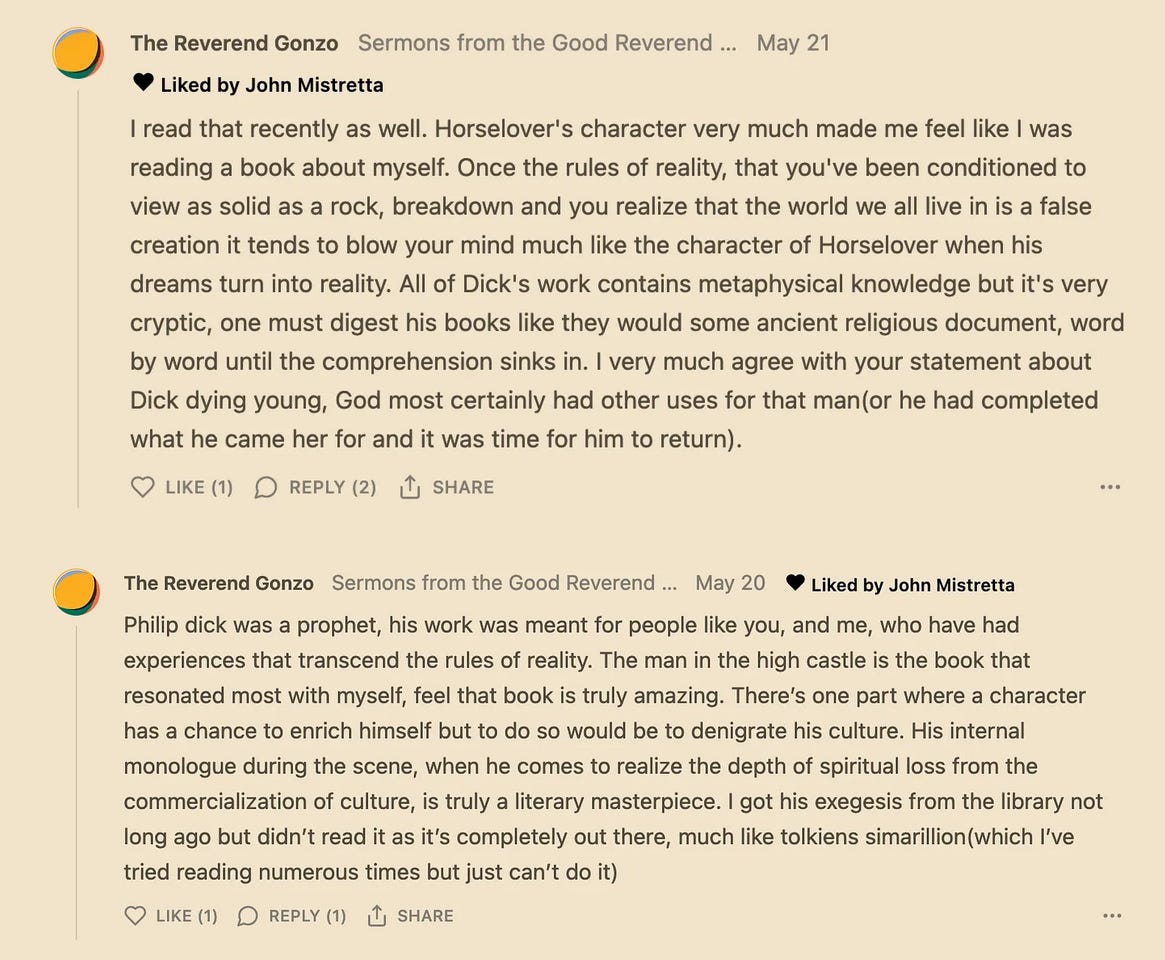The Thinking Man's Guide to "The Man in the High Castle"
An introduction to the Thinking Man Book Club's next pick.
John’s Comments:
Much has been said regarding The Man in the High Castle here on Thinking Man. My post about its genius author, Philip K Dick, sparked fantastic comments from the community. The post discussed the author, his exegesis, Valis, synchronicity, God, and life after death. This led to further “Dick”-inspired discussion in the ensuing “Community Comments” post Melissa made. Go check those comment sections out if you want a brain blast of Dick-spired information:
Since
was the first one to mention The Man in the High Castle, I’ll leave his awesome comments here:The Man in the High Castle was inspired by Bring the Jubilee (1953) by Ward Moore, which is an alternative history novel where the Confederates won the Civil War. It sounds like a pretty interesting novel—and exactly what The Man in the High Castle is to WWII. That’s right. If you somehow didn’t know, this book is also an alternative history work where the Axis Powers won WWII. If you’ve seen the show or read this already, please no spoilers. We usually pick pretty bad books for the Thinking Man Book Club and are hoping this breaks that streak.
Anyway. There’s a famous Dick speech called ““If You Find this World Bad, You Should See Some of the Others,” given at a sci-fi convention in France in 1977. I’ll link to it below; it’s a fascinating listen. During the speech he mentions God, the multiverse, and living in a simulation. (
can give you some expert information on that last bit.)He talks about this alternate reality in Flow My Tears, the Policeman Says (amazing book btw) and tells the audience it’s a real place, an alternate world from our own. He continues, “In novel after novel, story after story, over a 25-year period, I wrote repeatedly about a particular other landscape, a dreadful one. In March 1974, I understood why . . . I had good reason to. My novels and stories were, without my realizing it consciously, autobiographical.”
Is The Man in the High Castle from another alternate reality he saw? Maybe. Either way, it’s not the one that we’re in (thankfully), but I’m excited to read about it. I’ve heard that this isn’t Dick’s best work (no surprise for us to pick this then), but it may be his most famous. I’m excited to get started and read along with you guys. Here’s the link to that speech, and see you next week for our discussion of the first eight chapters!
Melissa’s Comments:
I have to admit, I cheated a little bit. I read the first two chapters of the book before writing this. Surprise surprise, it’s not my favorite PKD book, but I like it, and it’s a hell of a lot better than our other TMBC picks so far, so I won’t look a gift horse(lover fat)1 in the mouth.
It’s a good book. It has an interesting world. Great concept. There’s lots of food for thought here.
Don’t worry, it’s still too early for spoilers, but I do want to offer some context about a book that seems like it will be referenced fairly often in The Man in the High Castle.
The book is the I Ching. The I Ching sounded kind of familiar to me because of a very brief Taoism ‘phase’ I went through a couple years ago. However, I didn’t really know anything about it until today. I consulted everyone’s favorite teacher (Google), and here’s what I learned:
The I Ching is an ancient Chinese text. It was written around 1000 BC. Confucius allegedly worked on an early version of it. In other words, it’s old as hell, and it’s also really cool.
Turns out, it’s a divination text (sorry if this was obvious to any of you—I had no clue). You don’t just read this book straight through. You ask the I Ching for advice, then either flip coins or do something with long, thin sticks (yarrow stalks, to be exact) in order to fill out a “hexagram”—a combination of six lines that corresponds to one teaching from the book. The one that shows up is supposed to be the advice you need to solve the problem you asked about.
Since I described this poorly, here’s an article that explained it for me.
Apparently a lot of people love this thing. Carl Jung consulted the I Ching often (he even penned an introduction to one edition). It seems interesting, and John and I want to start playing around with it.
We’ll report our findings next week. Follow along, and check back next Thursday for our report on chapters 1-8.
I think this might actually be a good one (and it’s not 500 pages long, at any rate, so if you don’t like it, you can power through instead of abandoning it like a lot of us did for The Name of the Rose).
I’m looking forward to hearing your thoughts, and happy reading!
Thank you for reading. If you enjoy these posts and would like to support our work, consider becoming a free or paid subscriber.
For an extra dose of good fortune, you can even Buy Us a Coffee. Those yarrow stalks aren’t cheap.
Horselover Fat is the protagonist of PKD’s Valis—Philip means “horselover,” and “dick” means “fat” in German.









Have you or John ever listened to Terence McKenna? He covered the I Ching extensively. Of course like Dick, and Jung, there is rumor that he is connected to the CIA mind control/social engineering agendas at organizations like Esalen in Big Sur, CA... but that doesn't mean, we are not living in a simulation of some kind.
Yay, can’t wait! It’s very rare for people to actually read books I recommend so hoping you both enjoy the book(I read hundreds of books per year so if y’all need more recommendations feel free to hit me up). The plot is somewhat disjointed, wonder if that was intentional as it leads to a reality that is constantly shifting throughout the book, and it’s the characters that resonate for me. Won’t post spoilers but my 2 favorite characters are Childress and tagomi, both have great character arcs.